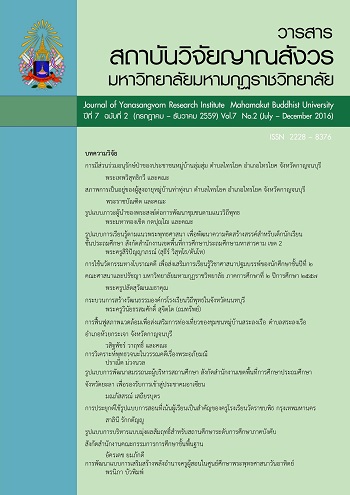Quality Standards for Learning Outcomes of Students Teaching in Schools, Theological Seminary, Kalasin Mahamakut Buddhist University
Main Article Content
Abstract
This study has an objective. To study the standard of learning achievement of students in the educational institution. To study the factors that affects the quality of the learning outcomes of the students in the educational institution. And to provide advice on how to adjust curriculum and teaching methods in educational institutions to be of high quality and in accordance with the standards of academic achievement under the Framework for Higher Education National The results were found as follows: The standard of learning achievement of the students in the educational institutes in all six levels was at the highest level. 1) Moral and ethics found that the standard of learning achievement of the students in the educational institution was at the level of the first is that the students respect the rights and listen to the opinions of others, accept the value of the difference, the second is the student. Professional Defined by the professional organization is the Teachers Council has moral ethics for teachers, such as the merits of Dharma 7, discipline, punctuality, honesty. 2) The knowledge that the standard of learning achievement of the students in the educational institution is the highest level, the first is the students have knowledge in basic sciences. of life And can be adapted to the lifestyle. Secondly, it is possible to use knowledge to describe the phenomenon in a rational and knowledgeable way, understanding principles, theories and contents. 3) The intellectual skills found that the quality standards of learning outcomes of students operating in Educational institutions are at a very high level. First, they can solve problems in complex learning management. Offer solutions and lead to creative solutions. Secondly, there is intellectual leadership in thinking, developing, managing, learning, creatively and visually. And can think of the facts. Understand and evaluate information. And ideas from various sources for use in teaching practice. 4) Skills, interpersonal relationships, and responsibility were found to be at the highest level, according to the standards of the learning outcomes of the students in the educational institution. First, there is a good relationship with the students. Leadership and followers are responsible for the collective. Secondly, it recognizes the differences in social and cultural diversity. Good interpersonal and leadership skills. Have the initiative to properly analyze the problem on their own. 5) Numerical analysis skills. Communication and the use of information technology found that the quality of the learning outcomes of the students in the educational institution was at the highest level. The first is the ability to use computers and communication information. The pursuit of self-knowledge, storage and processing of information, and the presentation of information, followed by the ability to exercise good discretion in processing, interpreting and using information about the subjects taught. And teachers responsible for using information technology well. And it is very sensitive to quickly analyze and understand the information received from the learner. Both numbers are statistic or mathematical. 6) In the case of learning management skills, it was found that the quality according to the standards of the learning outcomes of the students in the educational institution was at a high level. The first was the specialization in learning management at the major. It will teach integrated. Secondly, they specialize in learning management for diverse learners. Both the students have. Talent Moderately able learners and those with special needs are innovative. And expertise in diverse learning management. Formal, non-formal and informal forms of creativity.
Article Details
References
ทิศนา แขมมณี. (2548).รูปแบบการเรียนการสอนทางเลือกที่หลากหลาย.กรุงเทพฯ: จุฬาลงกรณ์มหาวิทยาลัย
Celland, D.C. (1973). Testing for competency rather than intelligence. American: Psychologist.
Cronbach Lee Joseph. (1984). Essentials of Psychological Testing. New York : Harper and Row.
Ferguson, George Andrew. (1981). Statistical Analysis in Psychological and Education. 5th.ed., New York : McGraw-Hill.
Maslow, Abraham H.(1970). Motovation and personality. New York: Harper and Row.
Krejcie, Robert V. and Morgan, Daryle W. (1970). Determinining Sample Size for Research Activities. Educational and Psychological Measurement. v. 30, 607-610.
Vroom, V. H. (1964). Work and motivation. New York: John Wiley & Sons.


